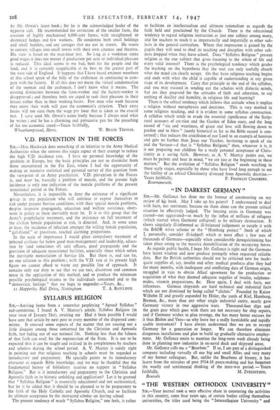"IN DARKEST GERMANY"
SIR,—Mr. Gollancz has done me the honour of commenting on my review of lai,s book. May I take up his points? I endeavoured to deal with facts, not sentiment, because on them alone can the present critical situation be effectively judged. The housing crisis in Germany was caused—not aggravated—as much by the influx of millions of refugees (which started when Germany collapsed) as by military destruction. It shows singularly ill-informed or ill-balanced judgement to couple it with the BAOR wives scheme` or the "Hamburg project" (both of which I, personally, consider ill-judged) which at most affect a few tens of thousands of Germans—especially when considerable derequisitioning has taken place owing to the massive demobilisation of the occupying forces. As regards public health,- I hope Mr. Gollancz is right and the Germans have learnt wisdom and now produce promptly when requested reliable data. But the British authorities should not be criticised now for inade- quate supplies of, say, insulin and other medical products after they had for many months, with inadequate and conflicting data of German origin, struggled in vain to obtain Allied agreement for the production or acquisition of what they deemed adequate supplies of insulin, sulphona- mides, vitamin preparations, &c. Here again, I deal with facts, not inferences. German shipyards are hard technical and industrial facts which are not dismissed by being called "clichés." Founded by Kaiser Wilhelm II and greatly expanded by Hitler, the yards of Kid, Hamburg, Bremen, &c., more than any other single industrial entity, nearly gave Germany victory in two aggressive wars. Thousand-foot slips and the giant gear which goes with them are not necessary for ship repairs, and if Germany wishes to plan revenge, she has many better excuses for it than- Blohm and Voss—so why leave her a really formidable and rapidly usable instrument? I have always understood that we are to occupy Germany for a generation or longer. We can therefore eliminate dangerous installations and plan to build up gradually alternative employ- ment. Mr. Gollancz omits to mention the long-term work already being done in planning new industries in ex-naval dock and shipyard areas.
Mr. Gollancz calls me a "Bourbon." If so, I am part of a distinguished company including virtually all our big and small Allies and very many of my former colleagues. But, unlike the Bourbons of history, it has learnt from the mistakes of post 1914-18 peace-making and has forgotten the woolly and sentimental thinking of the inter-war period. — Yours


































 Previous page
Previous page